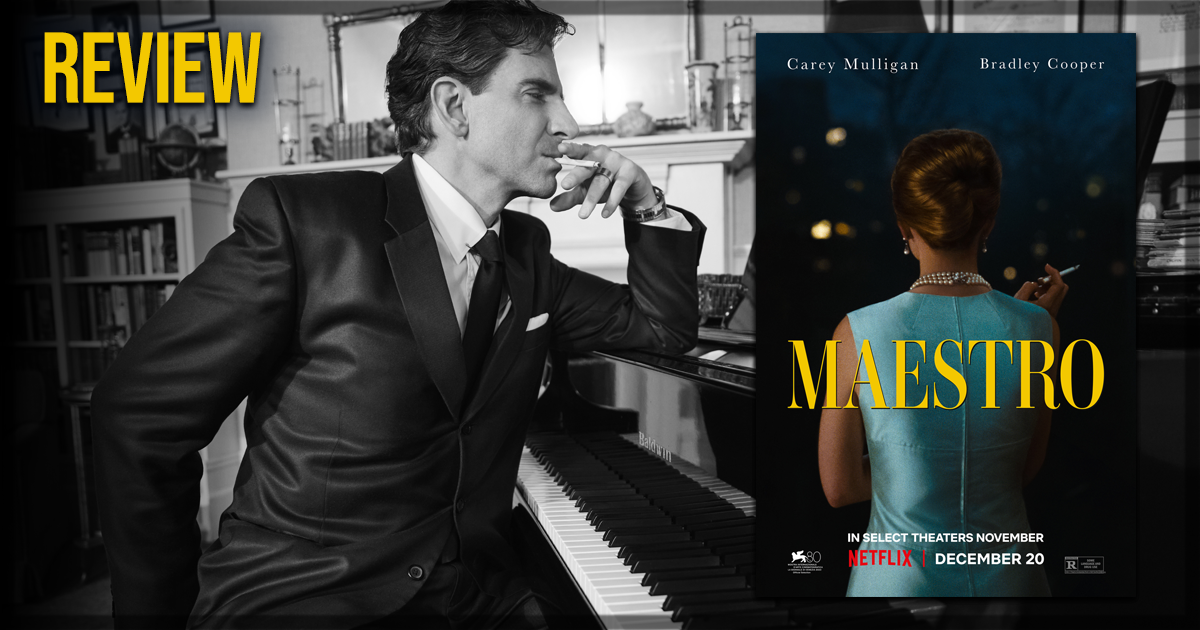Bradley Cooper is really trying hard. With his latest film Maestro, it has never been more apparent. Not only is the try-hard mode set to constant, but the film has very little flow and has very little to say about Leonard Bernstein as a subject.
Let’s get this out of the way first: Cooper is undeniably talented. He is a great actor and has a keen visual eye as a director. With that being said, Maestro is a film that screams “look how hard we are trying!” Nothing flows easily and comes naturally. Everything feels forced. There is a narratively-rich film about Leonard Bernstein to be made, but it’s not this one.
The story of Maestro
Cooper stars as Bernstein, sometimes in black-and-white, and sometimes in color. We first meet him in 1943 when he fills in for a sick conductor at the New York Philharmonic. He instantly rises to stardom. Why is he so good? Who knows? The film doesn’t seem to care about why he is so good, just that he is. He’s also quirky, composing scores on the toilet with the door open. Also, he is homosexual, living with clarinet player David Oppenheim (Matt Bomer). Does this matter initially…nope.
Flash forward a few years and Bernstein is a borderline celebrity. At a party, he meets and courts aspiring actress Felicia Montealegre (Carey Mulligan, also trying very hard). Suddenly he isn’t gay anymore, except when he is for narrative purposes. Leonard and Felicia have kids, he becomes a worldwide success, and then the things you expect to happen start happening. Lavish parties, drug and alcohol abuse, “I can’t go on like this” speeches, the best-of hits from a very well-known life.
To Cooper’s credit, he avoids the traditional cradle-to-the-grave biopic formula in favor of a completely different tact. That being said, nothing is learned from this approach. Bernstein’s homosexuality being a footnote until it becomes important for plot conflict. He begins openly gay, living with a man. Then he is fully committed to Felicia, until things start to unravel. Then it turns into a gentlemen’s agreement between husband and wife, until it turns fully into embracing the lifestyle. All the while he misses his wife, but doesn’t seem happy? It never establishes a foothold on what feeling Bernstein actually has and what his true desires are.
Maestro doesn’t explain Bernstein’s musical genius
Musically, it’s also cloudy. When the film begins, Bernstein is already the backup conductor, so his credentials are well-established. But his musical genius is never understood nor explored. The audience just has to accept that he is. What does he do besides conduct openly with larger-than-life emoting? We never know. That being said, the only scene where the film truly becomes magnetic is a third-act performance of Mahler’s Resurrection Symphony with an estranged Felicia looking on. If the film had half of the confidence and breadth that single scene had, this film could have been exceptional. Unfortunately, that’s the only scene where things are clear.
Cooper’s performance will garner a bushel of awards, but I just don’t see it. Cooper wants to encompass the skin of Bernstein, but a prosthetic nose and a higher-pitched voice is the limit to what he brings. Cooper doesn’t make Bernstein magnetic, charming, or even all that interesting. I never understood the term “straight drag” until this film, even though Bernstein would not be considered straight. Mulligan is equally poised for award attention, but she doesn’t do much for me either. She has a scene or two where she elevates the material, but then she disappears into the background of whatever shenanigans Bernstein gets into.
Bomer, Sarah Silverman, Josh Hamilton, and a host of other character actors come in and barely register. Only Maya Hawke, as the eldest Bernstein daughter, makes anything out of the characterizations apart from the central couple. The film doesn’t care about anyone other than those two.
Why is Bradley Cooper trying so hard?
It’s all constant effort to the point of exhaustion. Why is Cooper trying so hard? Just a bit of clarity and relaxation could have really made this film sing. Instead, it’s 100% hard work in film form. Nothing flows and nothing connects outside of that one Mahler scene. If Cooper needs an Oscar to calm his directorial style down, then so be it. I cannot say I’m excited for his next project if it keeps this level of tone of a massive undertaking. It’s not that the film is intense, but the style is nothing but intensity.
Maestro is Bradley Cooper trying his absolute hardest in every facet. No one was clamoring for this level of effort on a musical biopic, but he delivers 1000% effort, results be damned.
Score: 3.0/5.0
Have you watched Maestro yet? What did you think? How does the movie stack up against other musical bio pics? Join the conversation by leaving a comment below or by messaging us on X @MoviesWeTexted.
Interested in more reviews by Ben Miller? Check out his thoughts on the movie Napoleon or his review of The Holdovers.

